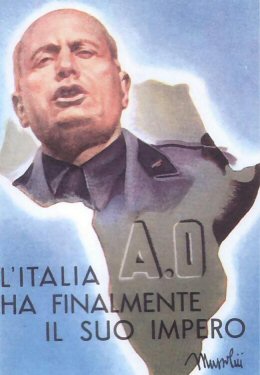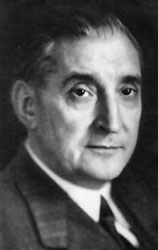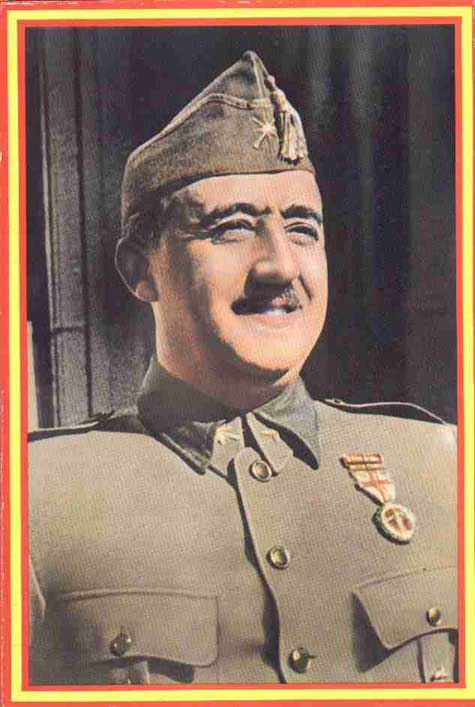NOTE ON THE DIFFERENCE BETWEEN FASCISTS AND NATIONAL SOCIALISTS:
Strictly speaking, the only "fascists" are the followers of Mussolini.

(click to enlarge)
Loosely, the difference is that the National Socialists believed in the primacy of racial factors and deficit spending. The "Fascists" (and their various foreign imitators) placed little or no emphasis on race, were often hostile to racial doctrines generally and National Socialism in particular, and usually believed in a balanced budget.
When Mussolini was appointed Head of State by the King of Italy in 1922, Italy had suffered 1.5 million people killed or wounded in the First World War; a politically-imposed bread subsidy threatened to destroy the Italian Lira as completely as reparations were destroying the German Mark, but could not be abolished because it was politically unacceptable; 180,000 politically-appointed railway employees could not be made to work but could not be dismissed; production was impossible because the Marxist-dominated labour unions had occupied all the factories and refused to work or leave; large parts of Italy were almost totally uninhabitable because of yellow fever or rocky, infertile soil and insufficient irrigation; irrigation and swamp-clearing projects had lain unfinished since the days of the ancient Romans. Mussolini balanced his very first budget, and solved all these problems in a very few short years, raising the birth rate of the Italian people and providing them with employment. These are significant accomplishments, which made "Fascism" very popular, at least initially.
Similar examples could be adduced from nearly all other nationalist systems. Salazar of Portugal balanced his first budget after decades of "democratic" chaos (3 revolutions, 18 military revolts, 40 governments established and overthrown, uprisings, invasions, assassinations, insurrections in all the colonies, persecution of the Church, confiscation of all Church property, the expulsion of the religious orders which performed all the functions of a modern welfare state [in a country which was 90% Catholic], etc, etc.: "...on May 14, [1915] the sailors mutinied, shot the captains of the 'Almirante Reis' and 'Vasco de Gama' and bombarded Lisbon...the revolutionary committees nominated Senhor Chagas as Premier, but on May 16 he was shot at and [fatally] wounded in the train, on his way to Lisbon, by Senator João de Freitas, who was killed... On December 5, 1917 a revolution... broke out at Lisbon... the rebels entrenched themselves in the Parque Eduardo VII and their artillery opened fire on the fleet... radical sailors mutinied on January 8, [1918] and bombarded Lisbon...on December 14 [1917] President Paes was shot at the Rocio Station by José Julio da Costa, and died a few minutes later...At Lisbon, the marines and Carbonarios [armed left-wing extremists, similar to the "checas" of Civil-War Spain], in February [1919] demanded government by 'soviets' and the abolition of the official police. Severe street fighting and serious outrages occurred, including the burning down of a block of government offices ...in October 1921, the barbarities culminated in the murder in cold blood of the Premier, Dr. Granjo, the founder of the Republic, Admiral Machado Santos, and other prominent persons. The appearance of foreign battleships in the Tagus made an impression, and brought the assassins to their senses for a time... successive governments seemed to lose control over the finances. No government was strong enough to raise an internal loan, to revise the system of taxation or levy a war-profits tax... taxes were paid in worthless paper money, [while] the Government had to buy wheat and pay the service on the national debt in gold... the roads... deteriorated... the state railways [fell] into a serious state of disrepair, and, consequently, it [was] found cheaper to import wheat directly from the Argentine than to send supplies to the north of Portugal from the Alemtejo [Central Portugal, east of Lisbon]...".
Salazar reformed the economy, balanced the budget, ran the country at a surplus for 42 years, invested the balance in national industries, public works, public housing, schools, near-free housing for university students, national industries, bridges, transport, and other internal improvements, without a penny of foreign debt. Salazar's system was based on the encyclicals of Pope Leopold XIII. One of his greatest accomplishments was to keep the country neutral in two wars which would have destroyed the country: the Spanish Civil War and WWII.

"While Lisbon isn't as affluent as, for example, New York City, one could see it lacked, in 1968 anyway, skid rows and wino habitats."
-- James Earl Ray, Tennessee Waltz: The Making of a Political Prisoner, St. Andrews's Press, 1987, p. 86.
---
In Spain, under Franco, it is still something of a mystery where the money came from to run the country: as long as he was alive the Spanish paid almost no taxes. Yet it was the Franco regime which carried out all the public works schemes which modernized the country. It was Franco who created the nation's first industrial courts, social and labour protection systems *, unemployment benefits, widow's pensions, etc.. The real so-called "fascists" of Spain and Portugal (the National Syndicalists) never considered Franco or Salazar "fascists" at all, plotted against them, and even attempted to assassinate or overthrow them on several occasions, for which several were imprisoned or banished (Manuel Hedilla in Spain, Rolão Preto in Portugal). Franco distrusted both Hitler and the Americans; Salazar was pro-British and believed in racial integration.

* The following is only a sample of "franquista" social legislation intended to protect workers and apprentices. All this legislation is still in effect, but its origins are never acknowledged. Note the dates. "Frente de Juventudes" = "Youth Front". Even today, apprentices are permitted to participate in paid camping trips, etc. as members of the "Youth Front" (presumably stripped of any "franquista" patriotic content). The original intention, like that of the Hitler Youth, was to get the youth out of the slums and villages and into the countryside, eliminate class prejudice, show underprivileged young people other regions of Spain, reduce infant mortality by teaching girls how to sterilize baby bottles, etc. etc. and so on.
D. = Decree, i.e., D. 6-8-38 = Decree of 6 August, 1938 (the Spanish Civil War only ended on March 28, 1939, with the occupation of Madrid)
Date in middle column = date of official publication in the Official State Bulletin (compendium of laws)
D. 4-8-38 |
6-8-38 |
Requires registration and signature of apprenticeship contracts in the Placement Offices |
D 23-9-39 |
5-10-39 |
Establishes compulsory apprenticeship in industries |
D 23-2-40 |
27-2-40 |
Establishes the creation of apprenticeship schools in private industries |
D-7-3-41 |
11-3-41 |
Grants permits to masters and workshop bosses to encourage apprenticeship |
D-20-4-42 |
26-4-42 |
On relations between apprentices, Placement Office and Frente de Juventudes, in application of Decree 6-21-41 |
D-16-7-42 |
21-7-42 |
On the concept of apprentices |
D-11-11-43 |
23-11-43 |
On institutions dedicated to vocational teaching or apprenticeships |
D-31-3-44 |
11-4-44 |
On Apprenticeship Contracts, Title III, Book II of the Law of Labour Contracts |
D-29-12-45 |
6-1-46 |
Grants twenty working days holiday for minors |
D-27-4-46 |
30-4-46 |
On facilitating [the purchase of] overalls for workers below the age of twenty one. |
D-2-6-60 |
23-6-60 |
Prohibits night work for minors below the age of eighteen. |
It is a mistake to believe that these regimes were never popular; Juan Perón of Argentina was overthrown twice: in October 1945, 200,000 of his followers descended upon Buenos Aires and made the country ungovernable. Perón was released from prison, held elections, and won on overwhelming victory. Ten years later, he was overthrown again. From exile, he instructed his followers to cast blank ballots in the upcoming elections, with the result that blank ballots outnumbered all others. Pinochet has one of the largest political parties in Chile, even today; Pinochet held elections, lost, negotiated a return to democracy, and voluntarily left power -- a feat of diplomacy unique in history. These are facts which can be verified by anyone.
--
Update August 2007: Anybody who doubts that Pinochet enjoyed (and probably still enjoys) considerable support can just go on www.youyube.com and search for "homenaje a pinochet", "gracias pinochet", or "pinochet discurso"; and you'll find a ton of stuff, most of it pro-Pinochet. On the other hand, if you search for "homage to bush", "thanks bush", or "bush speech", most of it is anti-Bush. OK, so where is Pinochet now that we need him? I admire Pinochet for overthrowing the government, not a bad idea at times, not necessarily for anything he did later.
The Bible [Eccl. 3:3] says "There is a time to kill and a time to heal "; it doesn't say:
"There is a time to privatize everything and a time to torture people". -C.P.
--
It used to be considered self-evident that any nation requires its own industries and employment for its own people. It takes the genius of the Jews to "prove" that a nation can be dependent upon its enemies to manufacture everything it needs, while simultaneously flooding the country with unproductive foreigners.
[Sources: 1922 and 1928 editions, Encyclopaedia Britannica, 1966 Collier's Encyclopedia; miscellaneous other books and periodicals; privately translated contracts and legal texts relating to employment in Spain]
See also:
Fascism Note by C.W. Porter
Mussolini image stolen from http://www.reichslieder.com/reichslieder_Tshirts_150.html


